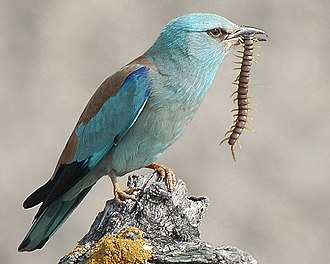Centipede





Centipedes (Chilopoda) are arthropods belonging to the class Chilopoda of the subphylum Myriapoda, which also includes millipedes and other multi-legged creatures. Centipedes are elongated metameric creatures with one pair of legs per body segment. Despite the name, which stems from the Latin centi- ("hundred") and pede ("foot"), centipedes can have a varying number of legs, ranging from 30 to 354. Centipedes are found in an array of terrestrial habitats from tropical rainforests to deserts.
Anatomy and Physiology[edit]
Centipedes have a wide variety of body forms. The body of a centipede is divided into a head and a segmented trunk. The head bears antennae, compound eyes (though some species are blind), and mouthparts. The first segment behind the head bears a pair of venomous claws called forcipules, which are used for hunting and defense. The number of trunk segments varies among species, each segment having a single pair of legs. Centipedes are predominantly carnivorous.
Habitat and Distribution[edit]
Centipedes are found in nearly every terrestrial habitat on Earth. They have adapted to live in moist microhabitats such as soil and leaf litter, under stones, and inside logs. Some species are adapted to desert environments, while others can be found in more temperate regions. They are nocturnal predators, feeding on insects, spiders, small birds, and reptiles.
Reproduction and Lifecycle[edit]
Centipedes lay eggs—sometimes in a nest, sometimes not. In some species, the female guards the eggs and, in some cases, the newly hatched young. The lifecycle of a centipede includes three stages: egg, nymph, and adult. Nymphs resemble adults but have fewer body segments and legs. They gain additional segments and legs with each molt until they reach adulthood.
Ecological Role[edit]
Centipedes play a significant role in the control of insect populations, acting as natural pest control. Their presence in an ecosystem indicates a healthy environment.
Human Interaction[edit]
While centipedes can bite humans if handled or threatened, their venom is not deadly but can cause pain, swelling, and redness. Some large species can penetrate human skin, causing discomfort similar to a bee sting.
Conservation[edit]
Centipedes are not generally considered endangered, but like many small invertebrates, they are susceptible to habitat destruction and pollution. Conservation efforts for centipedes focus on preserving their natural habitats.

Ad. Transform your life with W8MD's Budget GLP-1 injections from $49.99


W8MD offers a medical weight loss program to lose weight in Philadelphia. Our physician-supervised medical weight loss provides:
- Weight loss injections in NYC (generic and brand names):
- Zepbound / Mounjaro, Wegovy / Ozempic, Saxenda
- Most insurances accepted or discounted self-pay rates. We will obtain insurance prior authorizations if needed.
- Generic GLP1 weight loss injections from $49.99 for the starting dose of Semaglutide and $65.00 for Tirzepatide.
- Also offer prescription weight loss medications including Phentermine, Qsymia, Diethylpropion, Contrave etc.
NYC weight loss doctor appointmentsNYC weight loss doctor appointments
Start your NYC weight loss journey today at our NYC medical weight loss and Philadelphia medical weight loss clinics.
- Call 718-946-5500 to lose weight in NYC or for medical weight loss in Philadelphia 215-676-2334.
- Tags:NYC medical weight loss, Philadelphia lose weight Zepbound NYC, Budget GLP1 weight loss injections, Wegovy Philadelphia, Wegovy NYC, Philadelphia medical weight loss, Brookly weight loss and Wegovy NYC
|
WikiMD's Wellness Encyclopedia |
| Let Food Be Thy Medicine Medicine Thy Food - Hippocrates |
Medical Disclaimer: WikiMD is not a substitute for professional medical advice. The information on WikiMD is provided as an information resource only, may be incorrect, outdated or misleading, and is not to be used or relied on for any diagnostic or treatment purposes. Please consult your health care provider before making any healthcare decisions or for guidance about a specific medical condition. WikiMD expressly disclaims responsibility, and shall have no liability, for any damages, loss, injury, or liability whatsoever suffered as a result of your reliance on the information contained in this site. By visiting this site you agree to the foregoing terms and conditions, which may from time to time be changed or supplemented by WikiMD. If you do not agree to the foregoing terms and conditions, you should not enter or use this site. See full disclaimer.
Credits:Most images are courtesy of Wikimedia commons, and templates, categories Wikipedia, licensed under CC BY SA or similar.
Translate this page: - East Asian
中文,
日本,
한국어,
South Asian
हिन्दी,
தமிழ்,
తెలుగు,
Urdu,
ಕನ್ನಡ,
Southeast Asian
Indonesian,
Vietnamese,
Thai,
မြန်မာဘာသာ,
বাংলা
European
español,
Deutsch,
français,
Greek,
português do Brasil,
polski,
română,
русский,
Nederlands,
norsk,
svenska,
suomi,
Italian
Middle Eastern & African
عربى,
Turkish,
Persian,
Hebrew,
Afrikaans,
isiZulu,
Kiswahili,
Other
Bulgarian,
Hungarian,
Czech,
Swedish,
മലയാളം,
मराठी,
ਪੰਜਾਬੀ,
ગુજરાતી,
Portuguese,
Ukrainian